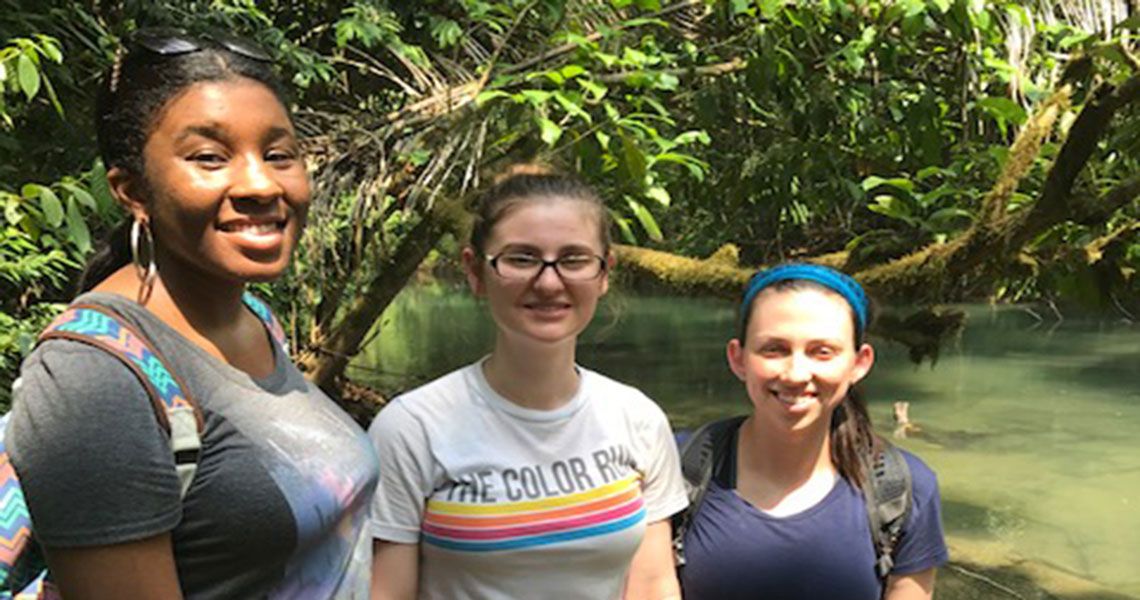More than 3,000 miles from Washington, D.C., lies the Toledo District of Belize, where in May 2017 three Doctor of Physical Therapy (D.P.T.) students at the George Washington University (GW) School of Medicine and Health Sciences (SMHS) spent six days learning about the country while also teaching its children about disability awareness.
Mandy Dunyak, Latay Benson, and Kyra Corradin, accompanied by Jill Boissonnault, Ph.D., P.T., associate professor of physical therapy and health care sciences at SMHS, traveled to Central America as part of a service learning experience for the Interprofessional Community Practicum course.
The students, who were chosen to attend the trip based on the quality of their essay applications, traveled to five primary schools in Belize to teach disability awareness to different age groups.
“The main idea of the education was that anybody with disabilities can still function and do everything,” said Dunyak. “We wanted to show the kids that other children may look a little different, but they’re still kids, and you can be friends with them because they still enjoy the same things as you.”
The University of Wisconsin-Madison started the trips to Belize, in partnership with Hillside Health Care International and Belize’s Ministry of Education, in 2009 when Boissonnault was an instructor and coordinator of the service learning courses and curriculum at the school.
“When I took the job here at GW in 2016, it seemed like a natural fit for GW to work with the University of Wisconsin-Madison in assisting these community partners and providing this disability awareness curriculum to all of the primary schools in the Toledo District,” Boissonnault explained.
The curriculum taught by Dunyak, Benson, and Corradin included activities such as a puppet show featuring a monkey named Manuel who only had one arm but could still climb trees with the help of his tail, and an activity where younger children made playdough tortillas with one arm. In addition, the D.P.T. students gave presentations on blindness and the use of Braille, and older children watched a video by the Ministry of Education that highlights a young man in the Toledo District who has cerebral palsy.
Corradin said she enjoyed the trip because of the opportunity it offered to become immersed in and be enriched by another culture.
At one point, while teaching an activity on blindness, Corradin said she was asked by a teacher how Braille works. “When I was able to explain it, I felt ‘now this teacher can instill that not just with this group of kids, but can carry it forward,’” she said. “I felt like I was leaving something impactful when the teachers were asking a question I could answer.”
Benson added that almost 10 years into the program, its impact on the children of the Toledo District can be seen. “Some of them, they’ve heard [these presentations] before … there’s a shift there, and I am happy we’re helping change the next generation’s thoughts on disability awareness,” she said.
That’s especially important in a country like Belize, “because the national health care system doesn’t really provide rehabilitation services,” added Boissonnault.
“There are some layperson-trained workers for children between zero and 6 [years old] with disabilities, but many children stay in their homes and don’t attend school; at least historically, it has been that way. And that’s part of the reason the Ministry of Education has worked on being more inclusive,” she said.
Now back in the states, Corradin said this kind of education could be just as impactful here. “The main thesis was how not to be a bully, how to be inclusive — that just because someone is different doesn’t mean they’re limited. That kind of message … is hugely important,” she said.



